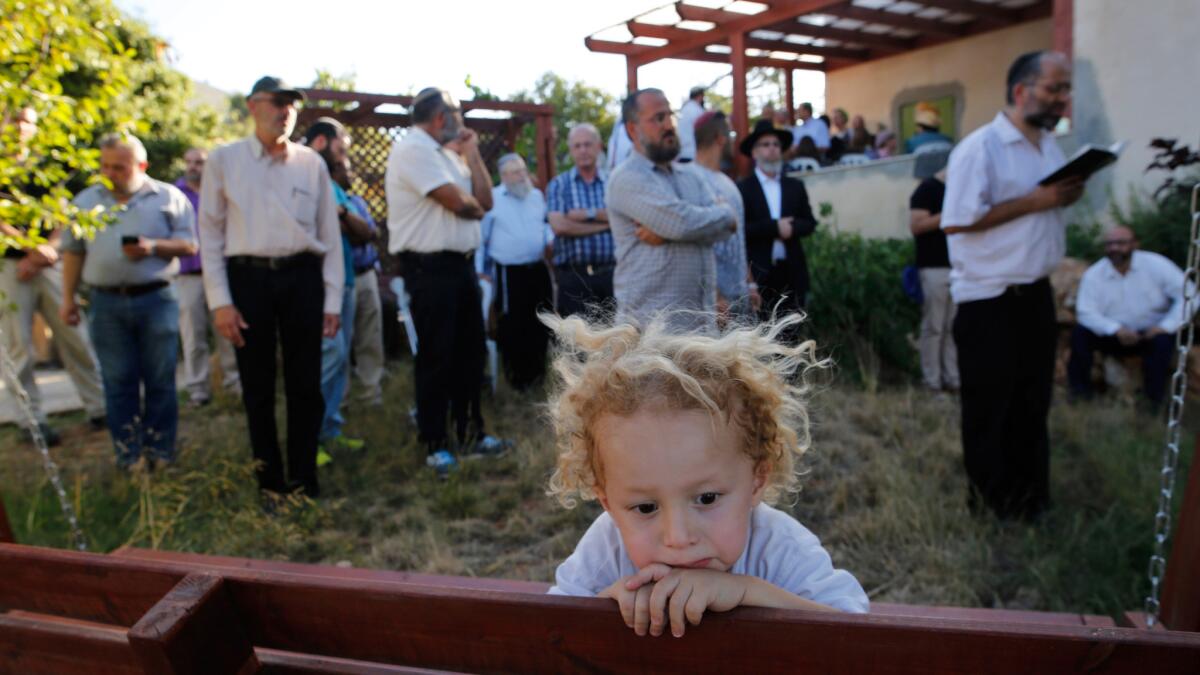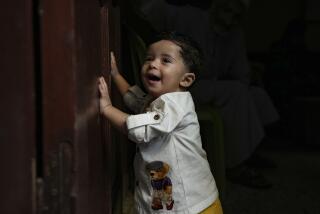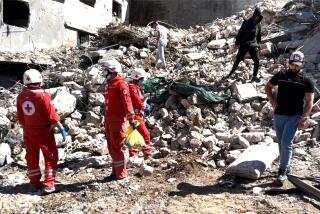New sense of vulnerability grips Israeli settlers after stabbing of 13-year-old girl

Reporting from Kiryat Arba, West Bank — Last week, 13-year-old Hallel Ariel’s bedroom was covered in blood.
Mohammed Tarayrah, a 17-year-old Palestinian from the neighboring village of Bani Naim, broke into her family’s home in a fortified West Bank settlement on Thursday and stabbed her to death in her bed. Settlement security guards burst in and shot him to death shortly afterward.
On Monday, the room seemed nearly normal. Hallel’s school certificates and artwork hung on the walls. A small scar in the floor tiles left by a bullet was the only trace of Thursday’s events. For the time being, Hallel’s two sisters had moved out of the bedroom they shared with her, her aunt said, sleeping instead in the living room.
Shortly after Hallel’s death, the West Bank and Israel saw two more knife incidents and a drive-by shooting that killed Rabbi Miki Mark, father of 10 from the nearby Jewish settlement of Otniel.
The attacks are the latest in a nine-month wave of violence in which young, politically unaffiliated Palestinians have carried out a mix of knifings, shootings and car rammings that have left dozens of Israelis and several times more Palestinians dead. Though Israel says most of those Palestinians were killed in the heat of carrying out attacks, human rights groups have accused Israeli security forces of excessive use of force.
The Israeli government blamed the violence on incitement from Palestinian political groups and incendiary messages spread through social media. Palestinians and peace activists say that continued settlement building and the absence of a political process toward a sovereign state has created a sense of hopelessness that fuels the attacks.
Though the attacks had been steadily abating more recently, the killing of Hallel Ariel appears to have triggered the worst two-day spate of violence in months.
In response, Prime Minister Benjamin Netanyahu’s government ordered a clampdown on hundreds of thousands of Palestinians in nearby Hebron and its surrounding villages, the likes of which hasn’t been seen in years. On Sunday, Israeli soldiers manned checkpoints at main access roads leading to Hebron, leaving lines of Palestinian cars at a standstill. The Israeli military also suspended permits to work in Israel for thousands of residents.
In the Palestinian village of Bani Naim, laborers employed in Israel were stuck at home and cars were being turned back at checkpoints. A mourning tent for Mohammed was set up and draped with yellow banners from Fatah, the ruling party of the Palestinian National Authority. No one knew when Israel would return the teenager’s body for burial.
“The situation in Bani Naim is miserable,” said Ishmaeel Mabnasra, an employee at the village municipality. “Twenty thousand people are under siege.”
An Israeli army spokesman said the closure of the villages was necessary to limit the movements of potential attackers and to hunt down those who carried out the drive-by shooting. Critics said the crackdown is an unwarranted collective punishment, meant to mollify right-wing supporters of the government.
While Israeli combat soldiers patrolled the idyllic vineyards on Sunday, Hallel’s parents, Amichai and Rena, sat in their salon receiving a steady stream of visitors, and told stories about their daughter, punctuated by occasional bouts of sobbing.
They said their daughter was an avid reader who was interested in studying zoology and, most of all, loved to dance. At the time of the attack, she was sleeping in after performing in a dance recital the previous night in Jerusalem.
“She used to dance and dance. She believed she wanted to continue,’’ said her mother, Rena, a Brooklyn native, as she held a picture of a beaming Hallel. “She loved living here. She felt happy here…. No one can understand what causes an animal to slaughter a teenager in her house who had just started to live.”
Hallel’s father, Amichai, found the girl with multiple stab wounds after the settlement’s community security guards told him the neighborhood had been infiltrated. He told visitors that he and his eldest daughter had planned to fill bottles with wine from the family vineyards that day. Instead, he said, Mohammed had come to “fill the world with the blood of a young girl.”
“What a volcano of black lava and hate,” he said.
Mitnick is a special correspondent.
ALSO
Some former hostages are being questioned over the deadly Bangladesh attack
Nigel Farage, head of the UK Independence Party, resigns after ‘Brexit’ victory
Suicide bombing reported near one of Islam’s holiest sites in Medina, Saudi Arabia
More to Read
Sign up for Essential California
The most important California stories and recommendations in your inbox every morning.
You may occasionally receive promotional content from the Los Angeles Times.










